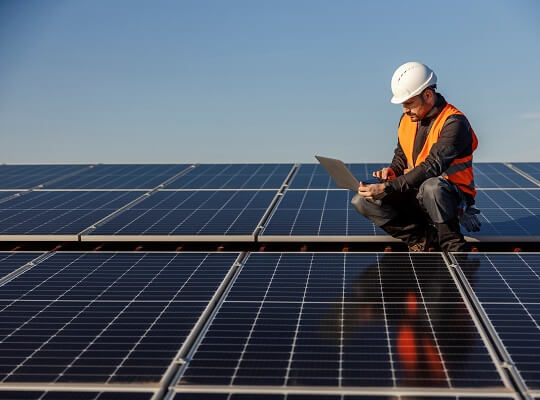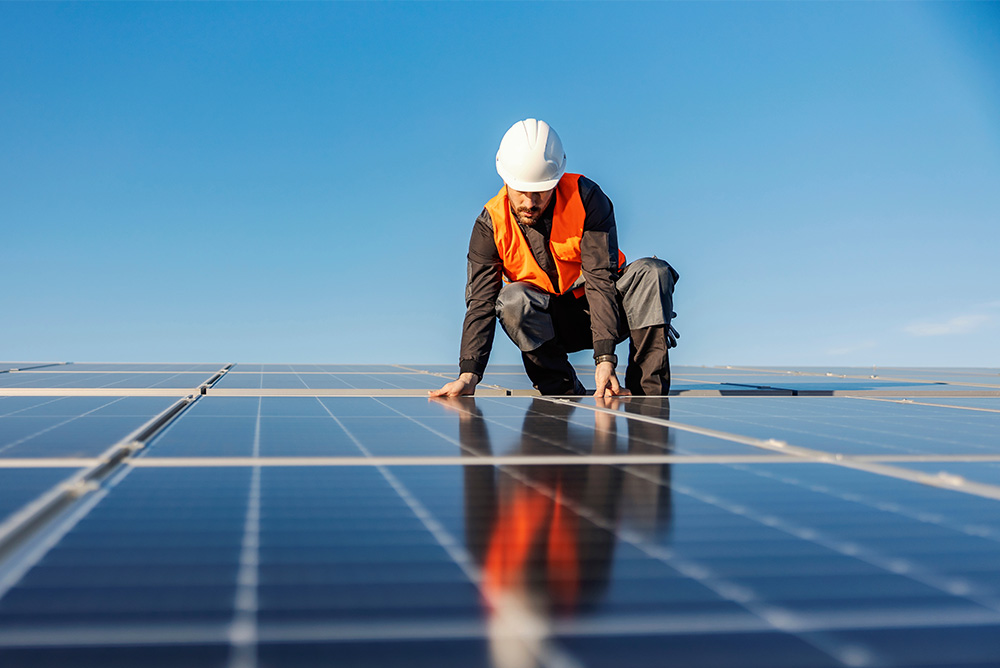Top Solar Power Installation Services in Fort Lauderdale: Selecting the Best Experts for Your Project
Top Solar Power Installation Services in Fort Lauderdale: Selecting the Best Experts for Your Project
Blog Article
How to Choose the Right Solar Power Installment for Your Energy Needs
Picking an appropriate solar power installment calls for a systematic strategy that starts with a clear understanding of your energy intake patterns and awaited future needs. Variables such as the type of solar modern technology, installation costs, and readily available incentives play critical roles in making an informed decision.
Assess Your Power Requirements
Assessing your power needs is a crucial initial step in the solar power installation procedure. Understanding your current and future energy usage will direct the style of a reliable solar system customized to your needs.
Consider seasonal variations in energy usage, as certain months might demand even more power due to heating or air conditioning requirements. Furthermore, examine any planned modifications in way of living or residential property, such as the acquisition of electric vehicles or home growths, which might enhance your energy demands in the future.
Once you have an extensive understanding of your energy intake, you can figure out the proper solar ability needed to satisfy those requirements. This assessment not only assists in sizing the solar installment however also informs choices regarding energy storage space services and potential grid connection requirements. solar photovoltaic. Eventually, accurately assessing your energy needs makes certain that your solar power system runs effectively, providing the advantages of renewable energy abreast with your usage patterns

Evaluate Solar Technology Options
When considering a solar power setup, it is important to assess the various solar innovation choices offered to make sure the system straightens with your energy demands and budget. The primary technologies consist of monocrystalline, polycrystalline, and thin-film photovoltaic panels, each offering distinctive advantages and downsides.
Monocrystalline panels are understood for their high efficiency and performance in limited area, making them appropriate for household installations with less roofing area. Nevertheless, they have a tendency to be a lot more pricey. Polycrystalline panels, while somewhat much less reliable, are normally more economical and can be an excellent option for larger setups where space is not a restriction. Thin-film photovoltaic panels are light-weight and flexible, perfect for unconventional surfaces, but they normally have lower performance and call for more space to produce the same power output.
In addition to panel kinds, take into consideration solar inverters, which convert the direct current created by the panels right into rotating current for home use. String inverters, microinverters, and power optimizers each have distinct benefits that can influence system performance. Assessing these choices will assist you make an educated choice that meets your power needs efficiently.
Consider Setup Expenses
Comprehending setup expenses is crucial for any individual considering a solar energy system. These prices can differ dramatically based on a number of aspects, including system dimension, kind of panels, and setup complexity. A normal property solar installation might range from $15,000 to $30,000 prior to incentives, which can be a significant ahead of time financial investment.
To precisely analyze setup expenses, it is necessary to obtain detailed quotes from several solar providers. These quotes should break down the prices of equipment, labor, permits, and any additional devices needed for the installation. Pay very close attention to the quality of materials being used, as higher-quality panels and inverters can cause far better efficiency and longevity, potentially countering greater initial expenses.
In addition, think about the long-term implications of installment expenses. A more affordable installment may save money upfront yet might lead to greater upkeep prices or reduced energy manufacturing in time. It is also recommended to examine funding alternatives, such as solar fundings or leases, which can impact your general monetary dedication.
Research Citizen Incentives
Exploring local incentives can dramatically influence the general cost of a solar power installation. Many areas use a variety of economic rewards focused on advertising renewable resource use, making solar energy much more obtainable and budget-friendly for house owners and businesses alike.
These motivations might consist of government tax obligation credit reports, state discounts, and regional utility firm programs that provide cash incentives or web metering options. For circumstances, the Federal Financial Investment Tax Obligation Credit Scores (ITC) allows you to subtract a considerable portion of your solar setup prices from your government tax obligations. State-specific rewards can better improve these cost savings, frequently in the type of straight cash rebates or tax obligation debts.
In addition, some neighborhood governments may supply real estate tax exemptions for solar installations, ensuring that your investment does not enhance your real estate tax liability. Looking into these incentives can discover significant cost savings, which can influence your decision on the size and kind look at this website of planetary system to mount.

Choose a Trustworthy Installer
Selecting a reliable installer is crucial to making certain the success and durability of your solar power system. The installation procedure considerably impacts the performance and performance of your solar panels, making it crucial to choose a service provider with a tested track record.
Following, verify the installer's credentials, consisting of licenses, certifications, and insurance policy. A trustworthy installer ought to hold certifications from identified organizations, such as the North American Board of Licensed Power Experts (NABCEP), indicating a high degree of expertise. Additionally, inquire concerning the installer's experience with comparable projects, specifically in your location, as regional climate and regulations can affect installment practices.
Request several quotes and contrast them not only on cost however additionally on the high quality of tools and guarantees used. A credible installer must supply transparent information concerning their items and services, helping you make a notified decision. her explanation By investing time in selecting a respectable installer, you will boost the general efficiency and longevity of your solar energy system.
Final Thought
Finally, choosing the proper solar power installment necessitates a detailed analysis of energy requirements, an understanding of readily available solar modern technologies, and a mindful factor to consider of setup expenses. Examining local motivations can enhance financial benefits, while selecting a reputable installer makes certain top quality handiwork and reliability. solar photovoltaic. By methodically analyzing these aspects, people can attain an optimum solar option that meets both existing and future energy demands, ultimately contributing to lasting power methods and cost savings with time
Report this page